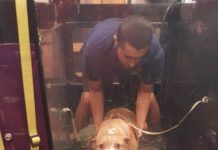Dear Doctor: The Dog Likes To Relax in Tight Spaces
My dog has always liked to squeeze himself into tight spaces to hang out - under the dining room table, between the couch and the wall, the bed and the wall, even on a shelf in the basement when I go down to do laundry. What is that about? Should I be concerned?
Dear Doctor: Should Dogs be Bathed After Swimming in Natural Water?
My dog is now almost a year old and absolutely loves to go in the water. There is a saltwater bay near our house that leads to the ocean, and nothing makes him happier than to splash around in it, and even swim in it. He grins from ear to ear. But should I be bathing him after each wet excursion? After all, water in a bay - or even in a stream or river - carries its own bacteria and other pathogens and may not be perfectly harmless. Also, I wonder if the salt in the water is prone to making the skin under his coat too dry. Please tell me the verdict on how often to bathe a dog who enjoys the ocean, lakes, ponds, or streams? I certainly wouldnt go into the water without bathing afterwards.
When Cancer Requires Emergency Treatment
Say cancer, and what comes to mind is not a mad rush to the emergency room to avoid imminent death but, rather, a slow-growing problem with gradual deterioration. However, some dogs (and people) with cancer often feel perfectly fine and exhibit no symptoms and therefore go undiagnosed - until a catastrophic emergency occurs.
Dogs Are Never Too Old to Get Pregnant
Is there an age when female dogs no longer go into heat, a sort of doggie menopause? I am asking because I just adopted two dogs who have not been spayed. One is 10, and the other is 5.
Physical Therapy Can Relieve Your Dogs Pain and Help Him Become More Active
When pitbull mix Brooklyn came to live with Rochelle Lucas and Aaron Roylance at the ripe age of 9, he tipped the scales somewhere between 90 and 95 pounds. The vet said, he cannot stay at this weight, Ms. Lucas recalls. Thats going to be really hard on his joints."
Embracing the Uncertainty
A common question vets get asked is What would you do if it were your dog? says John Berg, DVM, DACVS,
Tending to Fatty Tumors in Dogs
Even if its not a lipoma but, rather, a cancerous mass, thats no reason to panic. Many cancerous tumors can be safely removed without ever invading healthy tissue or spreading to vital organs in other parts of the body.
Why is Prescription Dog Food More Expensive Than Regular Dog Food?
Sometimes a dog has a condition for which a veterinarian will recommend a specific diet. Maybe the dog has a tendency to develop bladder stones, or suffers from kidney disease, or is allergic to certain ingredients commonly found in pet food and therefore needs special kibble, and the doctor advises that a particular food can mitigate symptoms or even help slow the course of the disease.
Dear Doctor – How could she not have noticed the kidney disease?
Since my dog is already 11, her veterinarian wanted to do some routine blood work to clear her for the anesthesia she was going to need for her yearly dental cleaning. The doctor gave her the green light for the anesthesia but said the blood test indicated that she might have chronic kidney failure. This has since been confirmed with an analysis of her urine in addition to imaging of her kidneys. The vet says she could potentially live for several more years but that she must begin treatment right away. How could I have missed this?
Ten Signs Your Dog Feels Stressed
Sometimes its easy to tell when your dog feels stressed - during loud fireworks displays, perhaps, or when he doesnt want to get out of the car in the parking lot of the veterinarians office. But there are signs of stress in our canine loved ones that can come across more subtly. What are they, and what can you do to calm your dog during those times that anxiety has gotten the better of him?
Budgeting for Pet Health Insurance Now Can Save You Heartache – and Wallet Ache...
I think at the end of the day it will probably be a wash, says Stacy Toczylowski, referring to the amount she pays on health insurance for her Jack Russell terrier, Bella, and the amount her dogs medical care actually costs. In other words, she believes that all told, the money the pet health insurance company reimburses her for Bellas care will essentially equal the amount she will have shelled out on the monthly premium. Still, she is not sorry that she bought a healthcare policy for her beloved dog. Why not?
Dear Doctor – Different vets with different views on aspirin?
In your October article on Sharing the Medicine Chest with your dog, you made no mention of aspirin. My veterinarian has prescribed 81 milligrams of aspirin twice a day for my 13-year-old border terrier, who has trouble climbing stairs and going for her walks. My friends vet has told her not to give aspirin to her German shorthaired pointer. What is the verdict on whether to use aspirin for pain in dogs?












